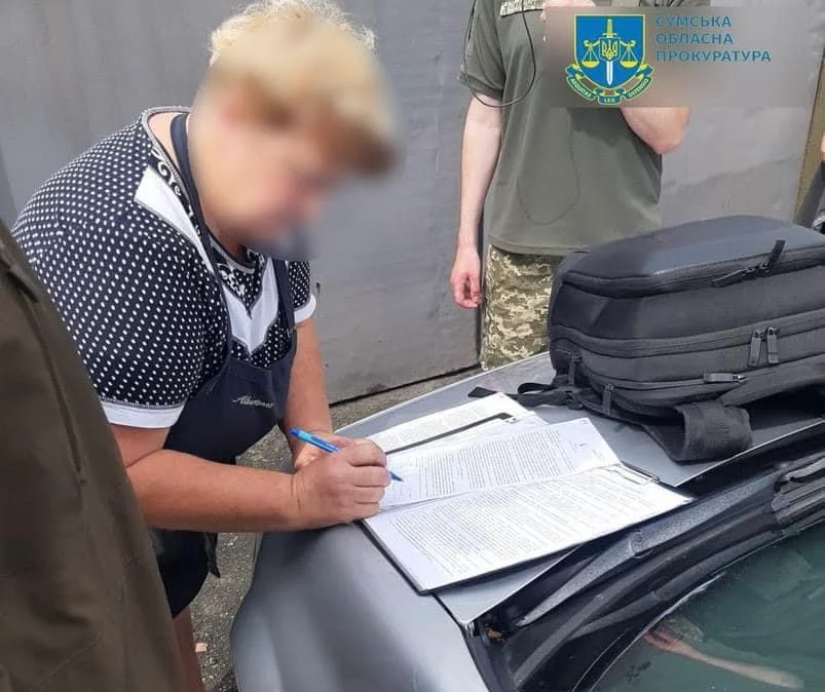On August 22, 2023, SBU officers detained Lyudmila Kyslyak, a 58-year-old pensioner residing in the village of Verkhnya Syrovka in the Sumy region.
Following the arrest, the SBU press service stated that Lyudmila was an informant who leaked information to the Russians to prepare air strikes on Ukrainian Armed Forces (UAF) positions and facilitate the infiltration of Russian reconnaissance and sabotage groups (RSGs) into the Sumy region. Russian intelligence services allegedly noticed her due to her “pro-Russian” activity on social media, promising her a Russian passport and evacuation to Russia in exchange for her assistance.
Kyslyak was charged under Part 2, Article 114-2 of the Criminal Code of Ukraine (transmission of information about the location of the UAF) and Part 2, Article 436-2 of the Criminal Code of Ukraine (justification of Russian aggression and glorification of its participants).
Following the SBU announcement, Ukrainian media labeled Lyudmila a spotter, but this is not reflected in the charges or verdict. While she did transmit unauthorized information, unlike many other cases, there is no indication that she did so to enable rocket or artillery strikes. No such strikes occurred.
The indictment states that from April to June 2022, Lyudmila Kyslyak posted materials on her Odnoklassniki social media page (with 240 subscribers) that “justified the armed aggression of the Russian Federation against Ukraine and glorified individuals who participated in the armed aggression that began in 2014.” On July 7, 2022, a report on violations under Part 2, Article 436-2 and Part 2, Article 114-2 was entered into the Unified Register of Pre-trial Investigations (ERDR), though the basis for this remains unclear—possibly a tip-off. On July 14, an SBU investigator examined Lyudmila’s Odnoklassniki page and deemed certain publications criminal. However, no further action was taken until an expert analysis of the reposts was conducted on April 6, 2023—nine months later.
According to case materials, on April 18, 2022, Lyudmila “liked” an image of two soldiers with chevrons depicting a grandmother with a Soviet flag, and the caption: “A Russian grandmother with a flag is now on the chevrons of our fighters in Mariupol. Strength of spirit! Strength of faith! Take care of yourselves!” On the same day, she “liked” an image of a person “resembling the head of the Chechen Republic, Ramzan Kadyrov,” with the caption: “I advise those who have forgotten to look into history and remember that Russia has not lost a single war, because at the moment of danger, the whole people rise up, like one big family.”
A linguistic expert concluded that these two posts glorified Russian forces participating in the aggression against Ukraine. However, this is not immediately obvious, as the post author refers to past Russian military victories, unrelated to the current war or 2014 events, and speaks of the people, not military structures. An alternative expert opinion might have been helpful. Regarding the Russian grandmother with the flag, the glorification of the Russian army is also not evident. The post initially states that the grandmother is depicted on chevrons; then, the soldiers are urged to take care of themselves—this is not glorification. On June 14, 2022, Lyudmila “liked” an image of a soldier with a “Z” chevron and the caption: “For peace without fascism! For a fraternal Ukraine, free from Nazis!” The expert considered this message to justify Russian aggression. While this interpretation is formally possible, an anti-fascist slogan as a criminal offense seems questionable. The only repost the expert found not criminal concerned a Mariupol schoolboy who, “despite his age and frail build, carried wounded DNR fighters, helped in the hospital, cleared rubble—performing adult, courageous deeds.”

In court, Lyudmila denied any criminal intent behind her “likes.” She simply holds positive feelings towards the Soviet Union—her youth and young adulthood—believes the path to the EU is wrong, and considers the 2014 Maidan events illegal and detrimental to Ukraine. Yes, she “liked” the messages, but she said nothing negative about Ukraine and did not intend to disseminate them. Under Ukrainian law, a “like” itself is not a crime. However, the SBU has long exploited a feature of Odnoklassniki where a “like” automatically republishes the post on the user’s page. Lyudmila did not intend to share anything; the social network did it automatically. But this was sufficient for the SBU and the court. 240 friends who could see the reposts constitute the publicity required for the charge.
Returning to the expert analysis of the reposts, they were conducted on April 6, 2023, although the reposts themselves date back to spring and summer 2022. This is relevant to the second (more serious) part of the accusation.
According to the case materials, between March 6 and July 26, 2023, Lyudmila repeatedly sent information to an unidentified individual about the UAF in the Sumy region that was not publicly available: the location of checkpoints and a military warehouse near the Sumyhimprom enterprise, troop and armored vehicle numbers, information on access control, the movement of Sumy Operational and Tactical Group (OTG) units, etc. Lyudmila Kyslyak explained that she believed she was communicating with someone living in Ukraine, as the individual possessed extensive knowledge, and she merely confirmed or denied this information based on her personal observations or what she had heard from others. This is a crucial detail that may explain what followed.
According to the prosecution, Lyudmila began communicating with the unidentified individual in February 2023, 2-3 weeks before transmitting the first information. This communication started on Odnoklassniki (the social network she actually used), although the data was subsequently transmitted via Telegram. The prosecution claims that her correspondence was monitored under covert investigative measures from February. How did the SBU learn that a woman from a village in the Sumy region was communicating with a Russian agent on her page with 240 subscribers? Incidentally, no agent has been identified; the identity of her correspondent remains unknown. But if this unknown woman was communicating with an unknown individual and not yet collecting or transmitting any information, why was she under surveillance? Later, once she began collecting data, she was under video surveillance from April 19 to July 31 and detained after a search in August 2023—approximately five months. For some reason, Lyudmila was allowed to transmit sensitive data that the enemy could use for military purposes. This was permitted and not prevented, despite the long-term surveillance; she could have been apprehended on the very first day—March 6. Considering that her correspondence was read, they could have prevented her first information-gathering trip. Then the SBU would have prevented the illegal actions, and the woman might not have ended up in prison.
Moreover, the forensic examination of old reposts was conducted only a month after Lyudmila began transmitting information – precisely when she had already taken the bait irrevocably, allowing the investigators to tie one charge to another. The prosecution could have gone to court with just the reposts, but that would have constituted a minor offense carrying either a short prison sentence or possibly probation. However, combined with the information transfer, the case takes on an entirely different dimension.
This strongly suggests that SBU officers in Sumy identified an ordinary local woman with oppositional views, likely discovered compromising reposts on her Odnoklassniki profile (possibly following a tip-off), and deliberately provoked her into committing a more serious offense.
On January 17, 2024, Ludmila Kyslyak was sentenced to three years imprisonment for the reposts and six years for transmitting data, even though the prosecutor requested the minimum sentence provided for in the Criminal Code article – 5 years. On May 13, 2024, the appeals court upheld the verdict. The cassation court confirmed the decisions of both lower courts.
This translation was made using a neural network. If you find any inaccuracies, please contact us.


